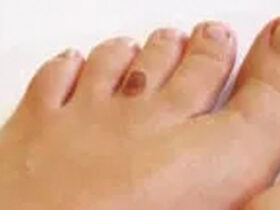Have a nagging ache in your feet? Do the aches come and go throughout the day and linger even when you are relaxing after a long day? You could have arthritis in your feet.
According to the American Podiatric Medical Association, 19% of men and 29% of women have concerns of foot pain on most days, and the prevalence in certain locations of the foot doubles with those with history of rheumatoid arthritis (RA). In persons with RA, inflammation and changes in bone and ligament integrity cause instability of the foot. The instability then leads to altered foot and ankle motion, higher pressure points and increased pain with weight bearing.
Mechanical stresses and muscle imbalance are major implicating factors in the progression of arthritis within the foot and the prevalence increases with age. Arthritis can be found within the midfoot, the hindfoot, and the ankle joint. These forms of arthritis can come from a traumatic injury as well. Women tend to be affected more due to the use of sandals, high heels, slippers, and flip flops.
Of course, like with most other areas of the body, arthritis can be treated surgically. However, not everyone wants to proceed and not everyone is always a candidate. The invasiveness of surgery also depends on the severity of the foot alignment.
So, what can be done conservatively if surgery appears to be the only option?
Much like the knees, cortisone injections are a possible solution. Cortisone injections have been a standard conservative treatment option for centuries and functions as an anti-inflammatory and pain reliever for the area.
With technological and biological advancements, we now have the option to inject amniotic fluid (source of stem cells) into arthritic regions. Amniotic fluid is the fluid that surrounds a baby in the womb and protects it by facilitating the exchange of water, nutrients, and biochemical products between the mother and child. The injection would allow the amniotic fluid to perform essentially the same role in the recipient’s body as it did in the donors. It contains an abundance of substances that promote healthy tissue regeneration.
Since the amniotic fluid is a natural product, it is healthier for the body and less damaging to the joints than a cortisone injection is.
In addition to injections, orthotics is another conservative measure to alleviate arthritic symptoms. Specific shoe types and footwear may provide an effective non-surgical intervention. Custom made orthotics have proven to improve alignment, change muscle activation and gait patterns which reduces joint loading.
Rigid orthotics are used to control excessive pronation (or flat-footedness), reduce loading at the ball of the foot, and decrease pain in both the rearfoot and forefoot. They can also reduce the risk of subsequent deformities such as bunions and hammertoes by 73%.
Conversely, softer orthotics are used for more rigid ailments, such as a high arched foot. There is increased load to the forefoot due to biomechanical imbalances with that foot type. A higher arched foot will still want to collapse over time and support is needed otherwise degeneration of the joints will still occur leading to pain.
Heat-moldable custom-made shoes, or orthopedic/therapeutic footwear tend to have increased bulk. Most people find that the size, aesthetics, design, weight, and comfort of the orthopedic shoes are unacceptable. Well-made running shoes along with custom made orthotics can offer some comforts without the extra size and weight.
Toe-rocker soled shoes reduce pain by decreased forefoot loading and promote normal heel to toe motion while walking. As RA progresses, the gait pattern in these individuals becomes more of a shuffled gait and the toe-rocker soled shoes can delay this progression.
The alignment of the foot can also affect other major joints of the lower extremities like the hips and the knees. Flat-footedness can cause increased load on the inside of the knees and a high arched foot can affect the hips. Again, accommodations in a custom orthotic can have long term effects on the muscular forces that cause the arthritis in the knee and/or hips.
If you are suffering from what possibly could be arthritis of the feet, get a thorough evaluation by a podiatrist. Custom made orthotics and amniotic fluid injections are offered at all Family Foot & Leg Center locations.
Sahiba Singh DPM, AACFAS
For more information, contact Dr. Sahiba Singh at Family Foot & Leg Center.
FFLC offers Same Day appointments at any of their 8 locations throughout Southwest Florida to quickly resolve all your foot and ankle problems.
Family Foot & Leg Center
6846 International Center Blvd, Suite B
Fort Myers, FL 33912
(239) 430-3668 (FOOT)
www.NaplesPodiatrist.com









